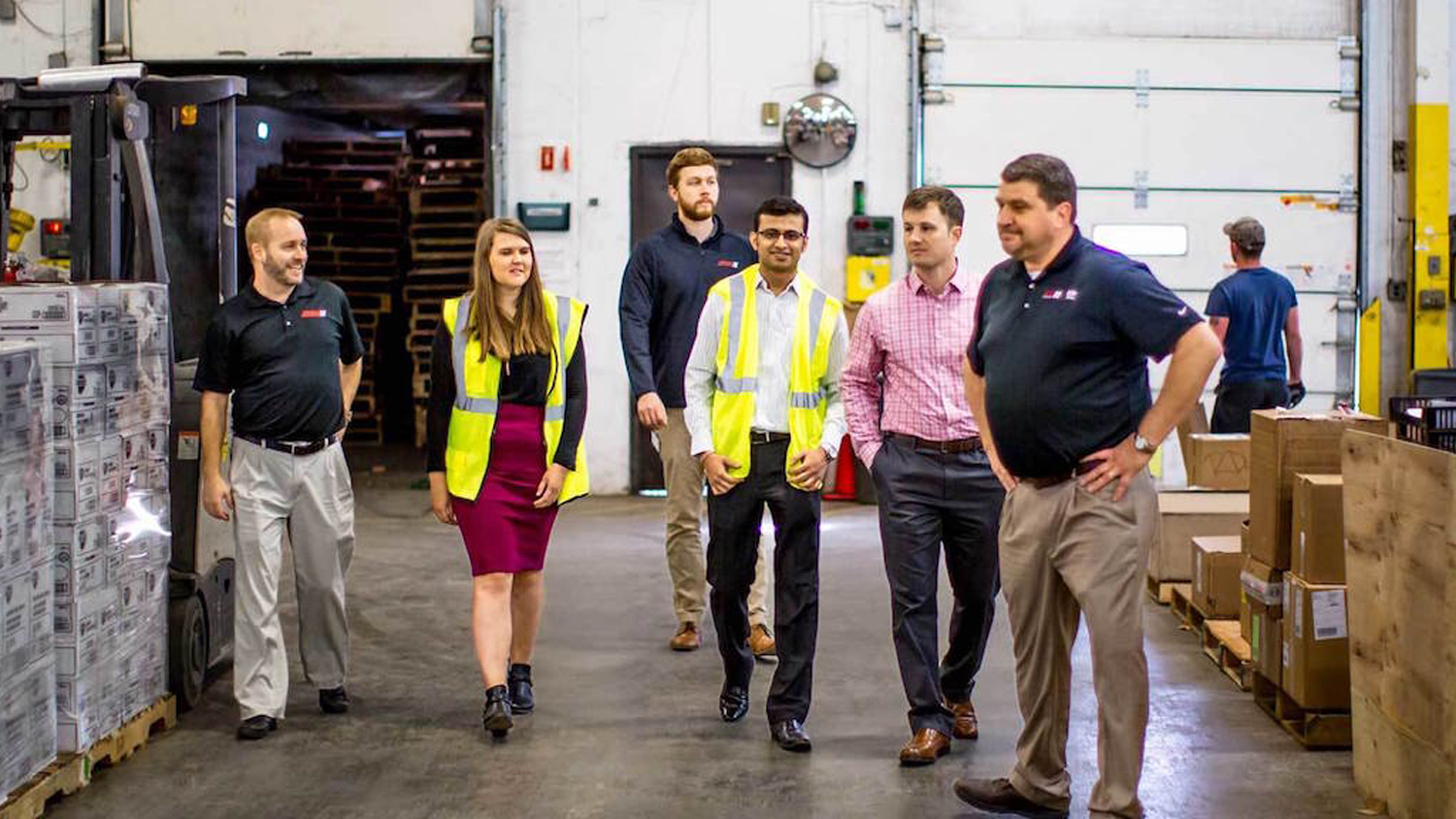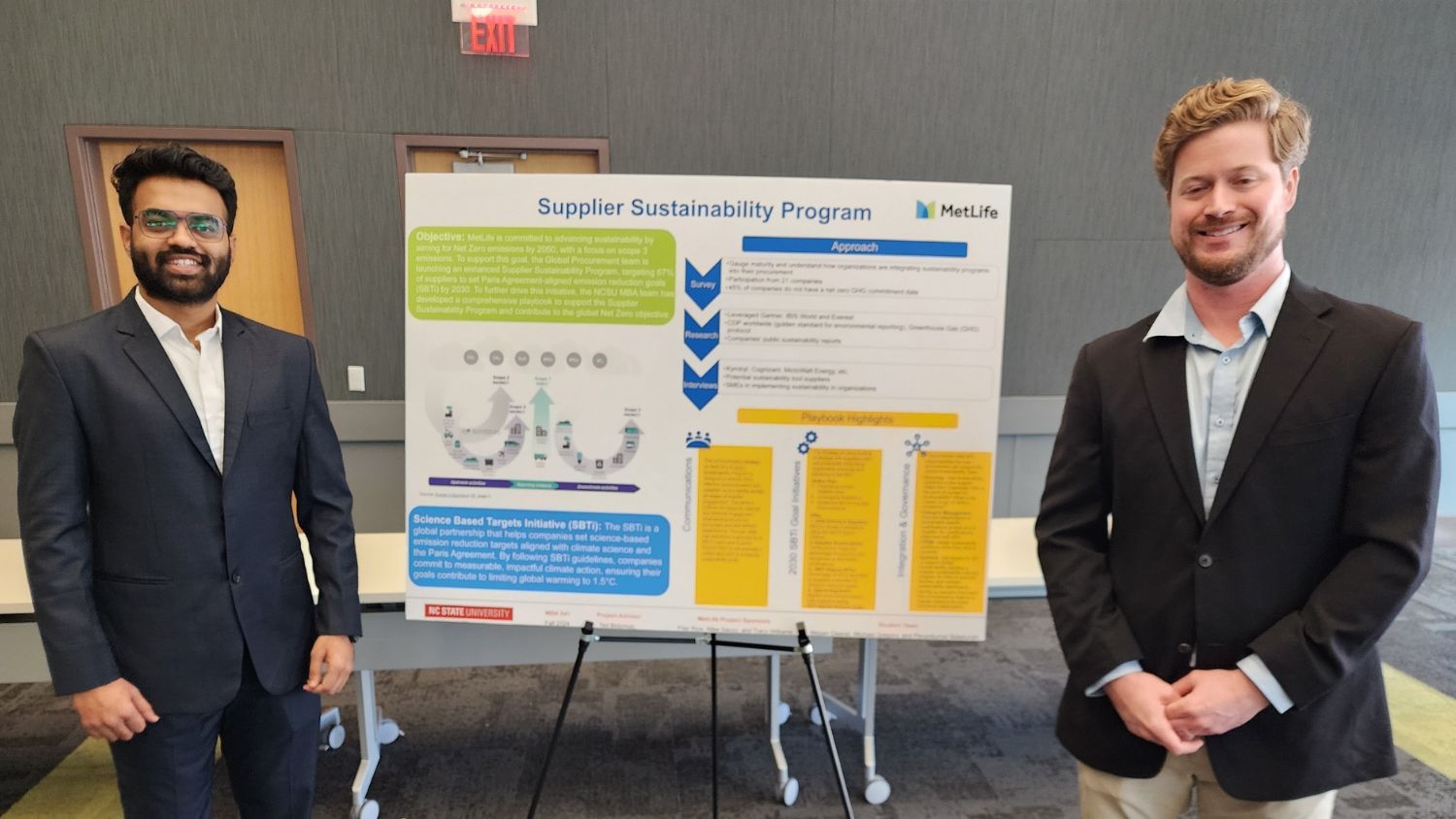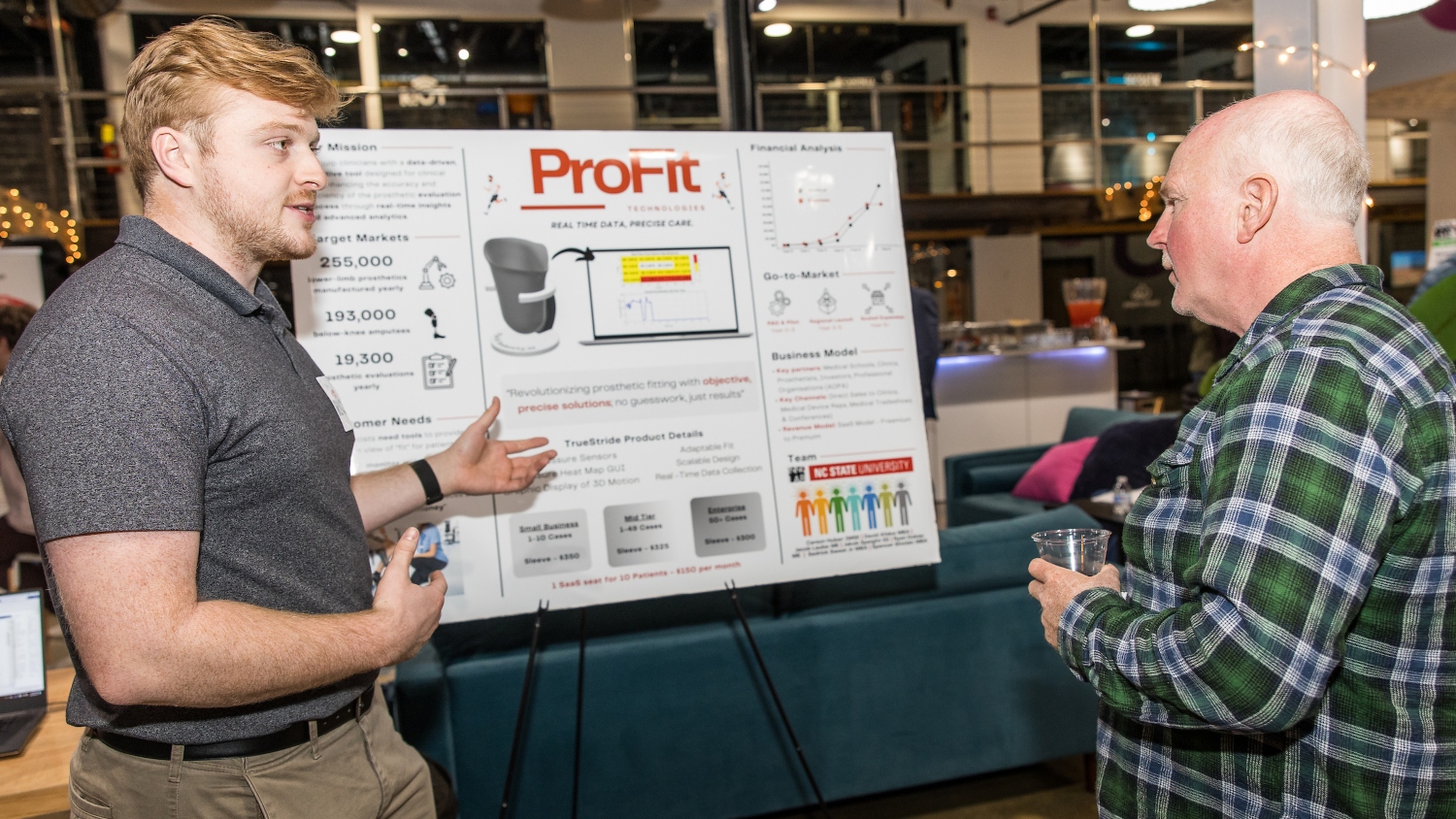Celebrating 20 Years of Supply Chain Innovation and Collaboration

By Adam Tompkins
When it comes to careers, Professor Rob Handfield knows what students need to succeed — real-world experience and research-based knowledge. That’s why Cecil Bozarth recruited him to join the NC State College of Management faculty twenty years ago, and why the college now puts industry engagement at the forefront of the student experience.
After recognizing a serious problem in the supply chain industry in 1999, Handfield and Bozarth worked to launch the Supply Chain Resource Cooperative (SCRC) — the school’s first-ever industry engagement initiative — to address the talent gap between what supply chain program graduates were offering and what employers were expecting of new recruits.
“When I joined the school, there was not a strong concentration in supply chain or operations management,” says Handfield, now the Bank of America University Distinguished Professor of Supply Chain Management and Executive Director of the SCRC. “There was a class on inventory, a class on production planning and control, and an introduction to operations; but not much else.”
One of the things Handfield found most appealing about his new position was the chance to work with an open slate. “Dean Jon Bartley at the time told me that he would support any efforts I made to create a supply chain center,” he says. “However, there wasn’t much funding to do so.”
Seeking additional support, Handfield invited Dave Nelson, former VP of Worldwide Supply Management at John Deere, to speak at one of the school’s executive forums. “On the ride back to the airport, I convinced Dave that we should start up a center where faculty, students, and company executives could work together on applied research projects,” he says. “Dave was so excited that when he got to the airport, he picked up a payphone, dialed his right-hand man, Art Rowe, and told him ‘we have to support these guys — this is a brilliant idea!’”
John Deere ultimately provided seed funding for a series of field-based student projects during the 2000 spring semester, which culminated with an executive-level report and presentation to the sponsor that highlighted key findings and actionable recommendations.
Handfield has continued to build new industry relationships over the last 20 years, and in that time, nearly 3,000 students and over 280 corporate partners have joined forces through the SCRC to find solutions to more than 700 real-world problems and disseminate research to industry professionals across the globe.
Impact on students
The collaborative field-based projects have remained at the core of the undergraduate and graduate student experience for supply chain students at the Poole College of Management, with each team presenting their work at the end of each semester to compete for first place honors.
Last semester’s 2nd place team of undergraduate students included Matt Cozzolino, Max Prestage, and Porter Jefferson, who worked with corporate partner Advance Auto Parts to analyze the company’s management of storage totes and the subsequent impact on operating expenses. “Having no previous supply chain work or internship experience, the project really helped facilitate my transition from learning about supply chain practices in the classroom to applying my knowledge in a real world situation with a reputable and established company,” says Cozzolino. “I’m very appreciative of the SCRC for allowing me the opportunity to gain valuable skills by working with their partner companies.”
In addition to the hands-on experience acquired through team-based projects, the SCRC provides select MBA students the unique opportunity to work one-on-one with partner companies through its Graduate Research Assistant (GRA) program. These students, known as GRA’s, work closely with industry professionals and faculty mentors on applied research projects for SCRC corporate business partners.
Marilyn Nolte, a 2015 MBA alumna, worked as a GRA after being sold on the program’s applicability to her future success. “I really loved the idea of being able to spend time on site with a company where I could directly apply what I was learning in the classroom, and where I knew I would be faced with decisions like the ones I would have to make after graduation,” says Nolte. “I spent my first year with Novozymes where I worked on inventory projects, and then I worked with Caterpillar for my second year where I earned my Six SigmaGreen Belt through the process improvement projects they put me on.”
Nolte recently re-joined the operations team at Caterpillar as a full-time planning engineer, which she says is directly related to her experience with the company as a fellowship student. She has also kept close ties with the SCRC and currently teaches supply chain courses for the Poole College of Management as an adjunct lecturer.
Like Nolte, many former students have maintained relationships with the SCRC post-graduation to help fuel their success, thanks much in part to its vast network and the wealth of research and knowledge Rob Handfield and his team have to offer. “My relationship with Rob and the entire engine he’s built around supply chain helps me ensure I’m current and relevant,” says Joydeep Ganguly, a 2006 MBA graduate and newly-appointed Senior Vice President of Operations (CFO organization) at Gilead Sciences, one of the largest biopharmaceutical companies in the world. “People like Rob are on the cutting edge of innovation, and are continuously applying newer ideas to solve problems,” he says. “Being able to tap into his insights and network has been a huge source of my career development.”
This year, Handfield is working with Ganguly in an advisory role to apply 21st century analytics research and technology to more accurately ensure the added value of prospective projects within his group at Gilead. On his motivation to invest in Ganguly’s work, Handfield says, “One of the things I think is necessary to be successful in today’s environment is maintaining and nurturing relationships like the one I’ve had with [Ganguly] over the last 10 plus years. That’s really what the SCRC is all about: creating the right ecosystem for people to come together to innovate and share thoughts and ideas.”
Impact on Industry
Before moving to Gilead, Ganguly first sought the help of Handfield and the SCRC back in 2006 while working in Supply Chain at Biogen, a multinational biotechnology company and one of the original corporate partners of the SCRC. It was then that Handfield and his team helped to not only to improve the operational efficiency within the Supply Chain function, but created a framework for transformation that could be duplicated in other functions.
“Rob’s team developed a handbook of applications that we employed at Biogen — applications that proved successful and shaped the primary procurement model the company embraced.” says Ganguly. “We worked heavily on trying to reshape our entire GMP (Good Manufacturing Practices) procurement and operations analytics practice and were able to transform the decentralized procurement group across all dimensions, including the business processes, the talent and capabilities within the group, and the standards and systems used and the results the group delivered.”
Handfield and Ganguly hope to take their successful partnership and apply the same analytics-driven approach to problem solving and find ways to add value within Gilead’s operations functions this year.
The students that have come through the SCRC have had a commensurate impact on industry as Handfield and his faculty peers — albeit not without their support — through the hundreds of student team projects they have completed over the years, which have provided verifiable return on investment for companies like Caterpillar, Duke Energy, John Deere, Revlon, and Tesla.
“The student teams we’ve worked since partnering with the SCRC have developed tools, reports, and recommendations that have been deployed and yielded significant results for our organization, our product channels, and our end customers,” says Mike Schobert, Business Relationship Manager at John Deere, a five-year SCRC corporate partner. “We’ve leveraged our collaboration with the SCRC to ultimately innovate and strengthen our global supply chain.”
Industry companies have also enjoyed access to the talent pool of NC State supply chain graduates, including three-year partner American Red Cross. “In the two hires we’ve made from NC State’s program, both not only had the supply chain technical skills, but also the leadership skills necessary to be successful in a large, complex environment,” says Tom Nash, Head of Supply Management at the humanitarian organization. “Myself, my team and our stakeholders saw the return on investment of the new hires in the first couple months of them being on the job.”
Impact on the academic community
The SCRC’s influence has not been limited to its primary constituent groups — rather, Handfield understands the importance of working collaboratively with students and colleges across NC State’s campus, as well as with peer institutions. “It builds a stronger research platform when you have a range of people coming together to share ideas,” he says. “There needs to be more collaboration among colleges and universities.”
In 2015, Handfield teamed up with Jay Golden, a professor at Duke University at the time; Jesse Daystar, then a PhD student in the College of Natural Resources at NC State; and the U.S. Department of Agriculture (USDA) to create a way to model and measure the biobased economy.
The result was the 2015 publication of “Economic Impact Analysis of the U.S. Biobased Products Industry,” a report commissioned by USDA and co-authored by Handfield and Golden, who is now vice chancellor of research, economic development and engagement at East Carolina University. The database is the first to document the indicators of the biobased economy, detailing trends in multiple sectors such as agriculture, renewable chemicals, and biobased products.
ECU and NC State are now working together to develop a strong biobased products and renewable chemicals base in eastern North Carolina. “Being able to partner with our neighbors at NC State is a great opportunity not only for research, but I would argue for the state of North Carolina as a whole,” says Brandon Morrison, director of strategic initiatives at ECU within the Division of Research, Economic Development and Engagement, who was part of the collaboration with Handfield.
Creating the biobased database involved bringing together faculty from many institutions and universities, something which is uncommon in most academic settings. In addition to the SCRC, ECU and Duke University helped realize the achievement, as well as students and faculty from NC State’s College of Engineering, College of Textiles, College of Natural Resources, and College of Agriculture and Life Sciences.
Future impact
Over the last two decades, the SCRC has expanded its presence and impact locally and internationally. In providing support, services, and programs to supply chain management students, supply chain thought leaders and corporate partners, the SCRC has created a full circle of impact, innovation, and real-world solutions.
So, what’s in store in the next 20 years for the SCRC?
“Our scope of impact and industry value are the biggest assets of our supply chain program at NC State. Only the small size of our program and number of faculty are hindering us from reaching the upper echelon of higher education supply chain programs,” says Handfield. “If we can continue to grow our program’s numbers, I’m confident we will soon be ranked in the top ten programs in the country.”
To support future growth, the SCRC will bring on additional supply chain expertise. Soon to join the faculty for the SCRC is Tim Kraft, who will join the team as associate research director and assistant professor of supply chain management. “Tim is coming to us from MIT, where he is a visiting assistant professor of operations management. Previously he was on the faculty at the Darden School of Business at the University of Virginia. Tim’s research focuses on the impact of environmental and social responsibility issues on supply chain and operations management decisions, and he will be one of the key elements in helping us to engage in leading research with companies moving forward,” says Handfield.
When looking at the bigger picture, Handfield says, “It’s a great time to be working in the supply chain field, and the SCRC is right in the center of it all, leading the way in terms of research and innovation. I hope and expect to see the level of collaboration between NC State, industry, and the greater academic community grow to the point where we are the most trusted partners for companies seeking top supply chain talent. Most importantly, I hope we continue to find new and ever-improving ways to work together.”
- Categories:


